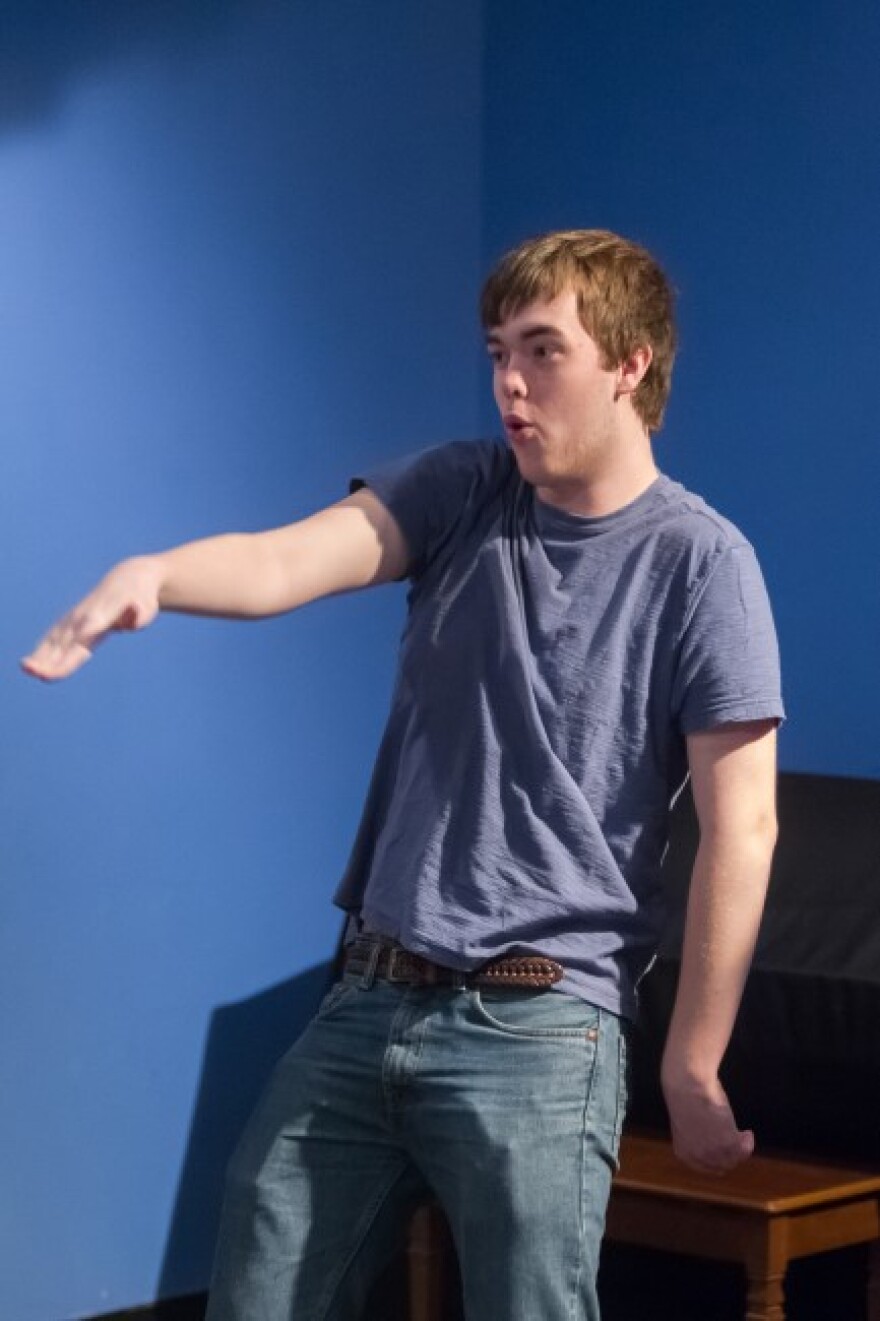Long-form improvisation is a grueling strain of comedy. But some of Kansas City’s funniest high school students are embracing it. Undaunted, they've spent the last few months trying, sometimes successfully, to master it.
Comedy audiences know about short-form improv, where a random word thrown out from the crowd provokes a three-minute sketch.

Long-form improv starts the same way, but it creates a whole show. Scenes build on scenes and circle back on earlier scenes to carry the story forward to a conclusion — half an hour or more later — that no one could have envisioned when the story started.
The art form has been around for decades, but it's just now becoming more popular with comedy troupes around the country, says Amanda Kibler, the education director at the Coterie Theatre, who has spent most Sunday evenings since January teaching long-form to the best of the Coterie's up-and-comers, students who have excelled in the theater's other comedy classes and were invited to audition for the comedy masters class.
Long-form improv requires a special kind of talent.
"The actors need to be (simultaneously) looking ten or fifteen minutes into the future, as well as looking back to the very beginning of the scene they’ve started creating," Kibler says, "because we have to make sure they tie up all the loose ends and see how they converge before the audience realizes what they’re doing."
In other words, a thirty-minute mind trip with an actor's brain simultaneously firing in three different directions: building on the past, planning for the future, and trying to create something entertaining in the moment.
A structure for the ethereal
There are formal ways of doing this. On Sunday nights, the students (mostly boys, many of them favoring gym shorts and school-logo T-shirts) crack each other up while adhering to a complicated organizing structure known as the Harold, a framework of games, scenes and monologues.

On one Sunday night in March, this resulted in a bizarre storyline in which different types of paper became human, and tried to elect a leader, splintered into factions — cardstock, computer paper, ballots, toilet paper — before reuniting for a paper revolution; the paper industry prevailed, while humans were forgotten.
It was ridiculous, but it was also hilarious. At the highest level of improv, says Blue Valley High School junior Evan Phillips (one of the standouts in this year’s master class) there's a "base reality" everyone can relate to.
"And then there’s this weird thing in the scene that stands out from that reality. So everybody’s acting normal, or at least normal to what they think is normal, there just happens to be something odd going on. And that’s where you’re getting your comedy from."
It’s hard to construct that reality on the fly, but when it works, Phillips says, there’s added satisfaction in having nailed something so fleeting.
"If you’re not recording it, then only the people who were there saw it, and then it’s gone forever. But it was something that was created in the moment, and it’s really palpable. It’s just fun to be a part of that."
Phillips is deeply involved in his high school theater department, like several other students in the Coterie's class. Some hope for comedy or acting careers, or want to at least continue performing somehow; others are just trying to improve their comedic timing so they can be better actors, or they want to be writers and are learning improv as a way to generate ideas.
Aidan Gray, a sophomore at Bishop Miege High School, says he likes coming to class because it allows him to channel impulses he otherwise tries to keep in check.

"The people who do this class, funny people in general, walk a thin line between being funny and energetic and being borderline annoying," Gray explains. "It's a good way for people to try to be funny and not worry about getting on people's nerves because it's for a scene or a show."
Keeping all of those funny people moving in the same direction is one of the challenges in this kind of comedy, Kibler says. So, there are rules.
The life lessons of improv
"It’s always important that you don’t ask questions — that you supply answers instead," Kibler explains. "So, 'yes and' is the big mantra. If someone gives an idea, you say yes and build on it. 'Yes and....'"
But an actor can't just stand there and take in ideas. The art form requires fearlessness.
"The risks are throwing ideas out there not knowing if they’re going to work because you just came up with it," Kibler says. "You have to be willing to throw an idea out there and say, 'Yes, that’s good, and I’m going to build on it.' The more bizarre, the better."
Finally, the best long-form improvisers have something else in common, Kibler says.

"It takes the most selfless actors and comedians I've ever met. One of the things we talk about a lot in comedy masters is: You should be the least important person on stage. Everyone else has to be the most important person on stage, so you’re constantly trying to raise them up. It never works if they're being too selfish, when they’re turning a little too focused on themselves."
All of it can be nerve-racking.
"Everyone who’s doing improv has gone to this point where you’re like, I have no idea what I’m doing but I just have to keep doing it," says Anna Sell, a senior at Scion High School. "Sometimes when you’re out on that ledge it doesn’t really go right. But sometimes it turns out beautifully."
The Coterie Theatre's Comedy Masters performance is 7 p.m., Saturday, April 16 at the Coterie Theatre in Crown Center, 2450 Grand Avenue, Kansas City, Missouri, 64108, 816-474-6552.
C.J. Janovy is an arts reporter for KCUR 89.3. You can find her on Twitter, @cjjanovy.





